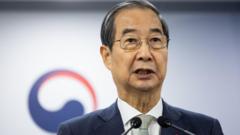South Korea's political scene is experiencing unprecedented turmoil as lawmakers from the main opposition Democratic Party (DP) have filed an impeachment motion against Prime Minister Han Duck-soo, who has been serving as the acting president since the impeachment of President Yoon Suk Yeol earlier this month. The DP has accused Han of obstructing the nomination of constitutional court judges and aligning himself with President Yoon’s controversial martial law attempt on December 3.
DP floor leader Park Chan-dae described Han's actions as those of an "acting insurrectionist," stating that his refusal to appoint the judges nominated by the opposition showcases a lack of commitment to defending the constitution. The impeachment motion is set to be voted on by parliament within the next 24 to 72 hours, with a requirement of 151 votes in favor out of the 300 members to pass.
The Democratic Party, holding 170 seats, along with their allies, control a total of 192 seats, giving them a strong chance to succeed in this latest attempt to reshape the leadership as tensions escalate. The ruling People Power Party defended Han's actions as a legitimate exercise of authority, suggesting that the opposition's claims undermine his role.
Tensions have further intensified following Han’s veto of several opposition-led bills, including one aimed at a special investigation into Yoon's martial law invocation and allegations of corruption involving the first lady. Han's cabinet meeting lacked discussion on key bills that the opposition demanded be addressed, leading to accusations from Park of his intentions being manipulative rather than conciliatory.
With Han's decision to withhold appointments until consensus is reached, the political stalemate continues. Park chastised Han, emphasizing the significance of his choices in history, contrasting him with Yoon's legacy of defiant governance.
As this unfolding drama continues, attention shifts to the Seoul Constitutional Court, which is reviewing Yoon's impeachment and facing public protests demanding his removal. Yoon's failure to respond to several legal summons has compounded the political crisis, pushing the limits of judicial tolerance and raising speculation about the potential issuance of arrest warrants for Yoon and several former high-ranking officials.
The interplay between opposition assertiveness, the incumbent government's resistance, and ongoing public protests intensifies South Korea's political crisis, foreshadowing critical decisions ahead that will impact the country's democratic fabric.
















